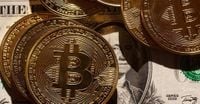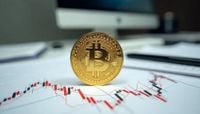In a surprising twist during ongoing coalition negotiations, party leaders in Germany have reportedly reached an agreement to implement a complete ban on Bitcoin and all related cryptocurrencies by the end of the year. This decision, attributed to insiders from the negotiations, has sent shockwaves through the crypto community and raised significant concerns about the future of digital currencies in the country.
According to an insider, "Yes, it is indeed decided. Bitcoin and all related cryptocurrencies are to be banned by the end of the year at the latest." The primary motivation behind this drastic measure is said to be the devastating impact of Bitcoin mining on the environment, particularly its enormous energy consumption, which contradicts Germany's ambitious climate goals.
A spokesperson for the negotiations emphasized, "The enormous power consumption of the Bitcoin network clearly contradicts our ambitious climate goals. We do not want to waste green energy on pointless calculations but rather advance the energy transition." This sentiment reflects a growing concern among environmental experts who have long criticized the energy-intensive nature of cryptocurrency mining.
As news of the proposed ban spread rapidly across social media, it sparked a mix of panic and confusion among crypto investors. Many rushed to transfer their digital assets to foreign accounts or anonymous wallets, fearing an impending crackdown. Some, however, accused the report of being a deliberate attempt to incite panic.
Experts have cautioned against hasty reactions, noting that an official confirmation of such a sweeping decision is still pending. A leading economic expert warned, "Such a far-reaching decision would be unprecedented, especially for Germany as a financial hub."
On April 1, 2025, the situation took an unexpected turn. Google searches for "Bitcoin ban Germany" skyrocketed, further illustrating the level of concern among investors. The initial trigger for this widespread uncertainty was an article published on the financial news site boerse.de, which was marked as breaking news and bore the sensational headline, "Bitcoin Ban Decided – Crypto Exit in Germany Causes a Bang in Coalition Negotiations."
Upon closer inspection, the article, while seemingly credible, was revealed to be an April Fool's joke. The text claimed, "Yes, it is indeed decided. Bitcoin and all related cryptocurrencies are to be banned by the end of the year at the latest," citing an anonymous insider from the coalition negotiations. It also included comments from supposed experts, such as, "The enormous power consumption of the Bitcoin network clearly contradicts our ambitious climate goals," and a high-ranking representative stating, "Bitcoin is an energy trap that we simply cannot afford in light of climate change."
The article's structure was cleverly designed to mimic a genuine news report, with the only indication of its true nature being the bolded date at the end. This led to widespread confusion and concern, as many readers did not immediately recognize it as a joke.
In response to the uproar, boerse.de later updated the article with a disclaimer stating, "For all those who believed this until now: Don’t worry, it’s April 1st. And yes – this note is just for you..." This addition came after numerous inquiries from concerned readers, prompting discussions about the ethical implications of such pranks, especially in sensitive areas like finance and investments.
Experts have since weighed in on the appropriateness of the joke, noting that while April Fool's pranks are culturally accepted, they can lead to real-world consequences, particularly in volatile markets like cryptocurrency. The fear of a potential ban could drive investors to make hasty decisions, potentially resulting in financial losses.
As the dust settles, the incident serves as a stark reminder of the volatile nature of the cryptocurrency market and the importance of verifying information before reacting. The confusion surrounding the article highlights the need for clearer communication, especially when dealing with sensitive financial topics.
In the end, while the proposed ban on Bitcoin was nothing more than a well-executed prank, it has sparked important conversations about the environmental impact of cryptocurrencies and the responsibilities of media outlets in reporting on such topics. As the world continues to grapple with climate change, the discussion around the sustainability of Bitcoin and other cryptocurrencies is likely to remain relevant.
For investors and enthusiasts alike, the April Fool's joke may serve as a cautionary tale about the unpredictability of both the market and the information surrounding it. As always, staying informed and cautious is key in navigating the ever-evolving landscape of digital currencies.


